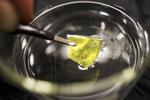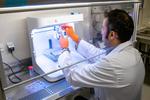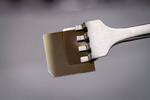Other

“An international research team with members from Linköping University, the Deutsches Museum and the Technical University of Munich, among others, has developed a method to manufacture two-dimensional polymers with the thickness of a single molecule. The polymers are formed on …

“Researchers at Linköping University, Sweden, have developed a stable high-conductivity polymer ink. The advance paves the way for innovative printed electronics with high energy efficiency. The results have been published in Nature Communications. Electrically conducting polymers have made possible the …

“It may be possible in the future to use information technology where electron spin is used to process information in quantum computers. It has long been the goal of scientists to be able to use spin-based quantum information technology at …

“One prospective source of renewable energy is hydrogen gas produced from water with the aid of sunlight. Researchers at LiU have developed a material, nanoporous cubic silicon carbide, that exhibits promising properties to capture solar energy and split water for …

“Researchers at Linköping University have developed biosensors that make it possible to monitor sugar levels in real time deep in the plant tissues – something that has previously been impossible. The information from the sensors may help agriculture to adapt production …

“Researchers at Linköping University have developed efficient blue light-emitting diodes based on halide perovskites. “We are very excited about this breakthrough”, says Feng Gao, professor at Linköping University. The new LEDs may open the way to cheap and energy-efficient illumination …

“Researchers at the Laboratory of Organic Electronics have for the first time demonstrated an organic battery. It is of a type known as a “redox flow battery”, with a large capacity that can be used to store energy from wind …

“Researchers at Linköping University have developed a molecule that absorbs energy from sunlight and stores it in chemical bonds. A possible long-term use of the molecule is to capture solar energy efficiently and store it for later consumption. The Earth …

“A research group led by Daniel Aili, associate professor at LiU, has developed a bioink to print tissue-mimicking material in 3D printers. The scientists have developed a method and a material that allow cells to survive and thrive. “Bioprinting is …

“Indium nitride is a promising material for use in electronics, but difficult to manufacture. Scientists at LiU have developed a new molecule that can be used to create high-quality indium nitride, making it possible to use it in, for example …
